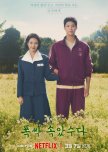Truly a love letter to the older generation
When Life Gives You Tangerine surprised me with its powerful depiction of 1960s in South Korea, a reality that mirrors what many Asian cultures have experienced. The struggles of women of that time, the weight of traditions favoring men, the hardships of balancing dreams with harsh realities, and the importance of community.
Ae-sun’s story echoes the lives of many women in her generation, my grandmother’s generation, maybe even yours. The drama powerfully explores how generational trauma and inherited dreams shape families, particularly mother-daughter relationships. Gwang-rye, pushed Ae-sun to escape her own fate. Ae-sun, in turn, worked tirelessly to give Geum-myeong a different life. Yet Geum-myeong’s resentment reveals how well-meaning sacrifices can sometimes create unintended consequences. Poverty and unfulfilled dreams hardened her, making her sharp-tongued, cynical, and distant. Even when her heart longed to show affection, her attempts to express gratitude often emerged as frustration and barbs. Meanwhile, Ae-sun’s focus on her daughter’s future left her brother feeling overlooked, as if he were an afterthought.
But what struck me most was how Ae-sun’s and Geum-myeong’s love lives mirrored each other, like a parallel, both faced difficult choices between love and self-preservation. Yet Geum-myeong, after witnessing her mother’s struggles firsthand, ultimately rejected her mother’s path. Just like how Ae-sun rejected her own mother’s path. Because that's how they were raised, to not walk the same path as their mother.
"I love my mom, but I don't want to live like her." "She gave everything for me, but at what cost?" "I don't want to tolerate what she did."
These are thoughts many daughters quietly wrestle with, loving their mothers yet fearing they may repeat their struggles. But to Gwang-rye and Ae-sun, their sacrifices were worth it. Some women surrender to fate and quietly plant trees whose shade they know they will never sit under, yet their efforts pave the way for their future generations to thrive. Ae-sun may have accepted her fate, but her determination ensured Geum-myeong could choose her own path. For that parallel, I commend the production team and writer for making IU play both Ae-sun and Geum-myeong. I must give it to the writer, every single character is so well crafted. Everyone played their role well, but IU's performance as Ae-sun truly defined the show. IU goes above and beyond, bringing such depth to Ae-sun’s character that her burdens, loneliness, poverty, and determination felt palpable through the screen. Special mention goes to Yeom Hye-ran for her short yet scene-stealing performances.
This is a powerful and deeply emotional story about love, loss, and RESILIENCE. And that’s what stayed with me most: even when life feels unbearable, and though you don't know how, somehow... life goes on.
And to anyone reading this...whoever, whenever, and wherever you are...you have done well.
Highly recommended.
Ae-sun’s story echoes the lives of many women in her generation, my grandmother’s generation, maybe even yours. The drama powerfully explores how generational trauma and inherited dreams shape families, particularly mother-daughter relationships. Gwang-rye, pushed Ae-sun to escape her own fate. Ae-sun, in turn, worked tirelessly to give Geum-myeong a different life. Yet Geum-myeong’s resentment reveals how well-meaning sacrifices can sometimes create unintended consequences. Poverty and unfulfilled dreams hardened her, making her sharp-tongued, cynical, and distant. Even when her heart longed to show affection, her attempts to express gratitude often emerged as frustration and barbs. Meanwhile, Ae-sun’s focus on her daughter’s future left her brother feeling overlooked, as if he were an afterthought.
But what struck me most was how Ae-sun’s and Geum-myeong’s love lives mirrored each other, like a parallel, both faced difficult choices between love and self-preservation. Yet Geum-myeong, after witnessing her mother’s struggles firsthand, ultimately rejected her mother’s path. Just like how Ae-sun rejected her own mother’s path. Because that's how they were raised, to not walk the same path as their mother.
"I love my mom, but I don't want to live like her." "She gave everything for me, but at what cost?" "I don't want to tolerate what she did."
These are thoughts many daughters quietly wrestle with, loving their mothers yet fearing they may repeat their struggles. But to Gwang-rye and Ae-sun, their sacrifices were worth it. Some women surrender to fate and quietly plant trees whose shade they know they will never sit under, yet their efforts pave the way for their future generations to thrive. Ae-sun may have accepted her fate, but her determination ensured Geum-myeong could choose her own path. For that parallel, I commend the production team and writer for making IU play both Ae-sun and Geum-myeong. I must give it to the writer, every single character is so well crafted. Everyone played their role well, but IU's performance as Ae-sun truly defined the show. IU goes above and beyond, bringing such depth to Ae-sun’s character that her burdens, loneliness, poverty, and determination felt palpable through the screen. Special mention goes to Yeom Hye-ran for her short yet scene-stealing performances.
This is a powerful and deeply emotional story about love, loss, and RESILIENCE. And that’s what stayed with me most: even when life feels unbearable, and though you don't know how, somehow... life goes on.
And to anyone reading this...whoever, whenever, and wherever you are...you have done well.
Highly recommended.
Was this review helpful to you?





